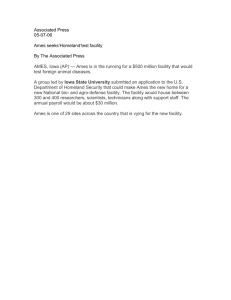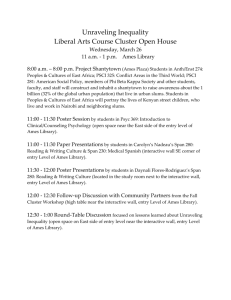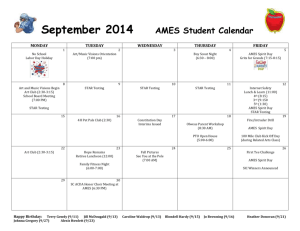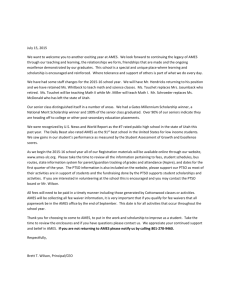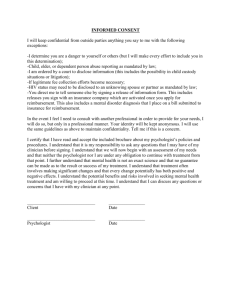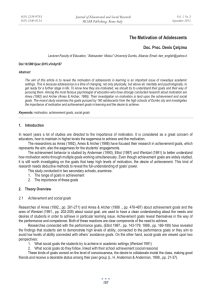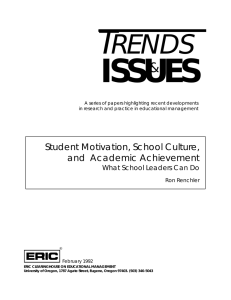Chapter 9 Motivation for Effective Learning: Cognitive Perspectives
advertisement
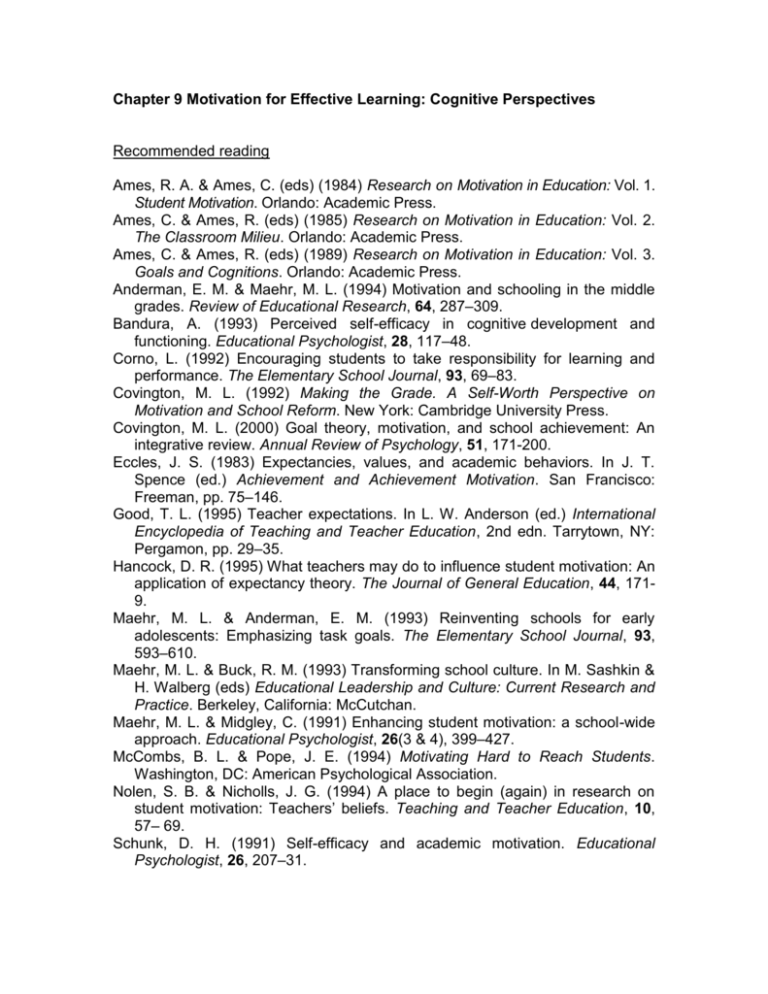
Chapter 9 Motivation for Effective Learning: Cognitive Perspectives Recommended reading Ames, R. A. & Ames, C. (eds) (1984) Research on Motivation in Education: Vol. 1. Student Motivation. Orlando: Academic Press. Ames, C. & Ames, R. (eds) (1985) Research on Motivation in Education: Vol. 2. The Classroom Milieu. Orlando: Academic Press. Ames, C. & Ames, R. (eds) (1989) Research on Motivation in Education: Vol. 3. Goals and Cognitions. Orlando: Academic Press. Anderman, E. M. & Maehr, M. L. (1994) Motivation and schooling in the middle grades. Review of Educational Research, 64, 287–309. Bandura, A. (1993) Perceived self-efficacy in cognitive development and functioning. Educational Psychologist, 28, 117–48. Corno, L. (1992) Encouraging students to take responsibility for learning and performance. The Elementary School Journal, 93, 69–83. Covington, M. L. (1992) Making the Grade. A Self-Worth Perspective on Motivation and School Reform. New York: Cambridge University Press. Covington, M. L. (2000) Goal theory, motivation, and school achievement: An integrative review. Annual Review of Psychology, 51, 171-200. Eccles, J. S. (1983) Expectancies, values, and academic behaviors. In J. T. Spence (ed.) Achievement and Achievement Motivation. San Francisco: Freeman, pp. 75–146. Good, T. L. (1995) Teacher expectations. In L. W. Anderson (ed.) International Encyclopedia of Teaching and Teacher Education, 2nd edn. Tarrytown, NY: Pergamon, pp. 29–35. Hancock, D. R. (1995) What teachers may do to influence student motivation: An application of expectancy theory. The Journal of General Education, 44, 1719. Maehr, M. L. & Anderman, E. M. (1993) Reinventing schools for early adolescents: Emphasizing task goals. The Elementary School Journal, 93, 593–610. Maehr, M. L. & Buck, R. M. (1993) Transforming school culture. In M. Sashkin & H. Walberg (eds) Educational Leadership and Culture: Current Research and Practice. Berkeley, California: McCutchan. Maehr, M. L. & Midgley, C. (1991) Enhancing student motivation: a school-wide approach. Educational Psychologist, 26(3 & 4), 399–427. McCombs, B. L. & Pope, J. E. (1994) Motivating Hard to Reach Students. Washington, DC: American Psychological Association. Nolen, S. B. & Nicholls, J. G. (1994) A place to begin (again) in research on student motivation: Teachers’ beliefs. Teaching and Teacher Education, 10, 57– 69. Schunk, D. H. (1991) Self-efficacy and academic motivation. Educational Psychologist, 26, 207–31. Urdan, T.C. & Maehr, M.L. (1995) Beyond a two goal theory of motivation and achievement: A case for social goals. Review of Educational Research, 65, 213–43. Weiner, B. (1994) Integrating social and personal theories of achievement striving. Review of Educational Research, 64, 557–73. Wigfield, A. (1994) Expectancy-value theory of achievement motivation: A developmental perspective. Educational Psychology Review, 6, 49–78. Wigfield, A. & Eccles, J. S. (1989) Test anxiety in elementary and secondary school students. Educational Psychologist, 24, 159–83. Wigfield, A., Eccles, J. S. & Rodriguez, D. (1998) The development of children’s motivation in school contexts. Review of Research in Education, 23, 73-118. Zeidner, M. (1995) Adaptive coping with test situations: A review of the literature. Educational Psychologist, 30, 123–33.
